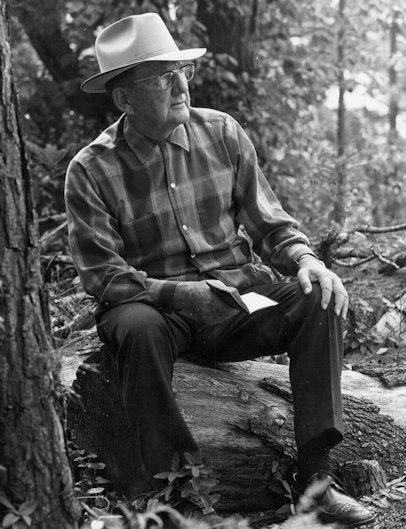
TL;DR:
William Cameron Townsend (1896–1982), known as “Uncle Cam,” was a visionary missionary with a passion for Scripture translation. Believing that “the greatest missionary is the Bible in the mother tongue,” he founded Wycliffe Bible Translators and the Summer Institute of Linguistics to pursue that vision. Townsend’s strategic thinking showed that evangelism must respect culture and language to be effective.

What can the birth of a Bible translation agency teach us about world evangelism?
Make disciples of all nations! Doesn't that sound exciting, ambitious and, . . . overwhelming? Indeed, the enormity of what God has called His people to do can either paralyze us into inaction or send us "running in all directions."
There is a better response than either of those extremes. The global missionary enterprise needs people who have a strategic plan to carry out Christ's Great Commission. William Cameron Townsend is a good example of a missionary who has thought, planned and worked strategically.
For Townsend, having the Bible in all of the world's languages was a strategic necessity for the Church if it was going to be serious about carrying out its God-given global mission. His tight focus on the need for Bible translation work has led today to translating and producing New Testaments in more than 1,000 languages and ongoing Scripture translation projects in more than 2,000 additional languages.
In the early part of the twentieth century, Townsend was fresh out of college when he went to Central America as a short-term volunteer. At that time, selling books, including Bibles, was a way Protestants could get by doing evangelistic work in Latin America. So, in order to "fly under the radar" and not run afoul of the authorities, Townsend became a traveling bookseller or what was then called a "colporteur."
After his return to the U.S., Townsend felt called to go back to Guatemala as a career missionary, where he again took up colportage evangelism. One day, in a village market, a man whose mother tongue was Kaqchikel came by Townsend's book stand. Townsend wound up trying to sell the man a Bible in Spanish.
Finally, the Kaqchikel speaker said something that more or less meant: "Mister, if your God is so smart, why doesn't He speak my language?"
At that point in time, Kaqchikel was an unwritten language. So, Townsend began learning it. Then, he devised a Kaqchikel alphabet so the language could be written. He then gave more than a decade of his life to translating the New Testament into Kaqchikel using the alphabet he himself had invented.
The mission organization that was then supporting Townsend scolded him for pouring so much time and energy into Bible translation when he was supposed to be evangelizing. Townsend's reply was simple and brief: "The greatest missionary is the Bible in the Mother Tongue."
Townsend realized that world evangelism efforts would be somewhat ineffective unless they were done in people's native tongue or "heart language." So, he dedicated the rest of his life to the cause of Bible translation.
He founded Wycliffe Bible Translators, now one of the largest Christian missionary-sending agencies. Today, Wycliffe is pushing to get Bible translation projects underway in every language that still lacks a Bible. The goal is to have all those translation projects going within a decade.
Because the man whom many knew as "Uncle Cam" worked strategically, the Bible is now in hundreds more languages than would have been, and lots of missionaries have acquired linguistics skills that make them far better communicators of the Gospel than they likely would have been.
Townsend thought it was important to approach Great Commission work strategically. The results show that he was right. Let's do the same!
-- Howard Culbertson, hculbert@snu.edu
William Cameron Townsend, born in 1896, was a visionary linguist and missionary whose impact reverberated throughout the 20th century. Renowned for founding both the Summer Institute of Linguistics (SIL) in 1934 and its associated organization, Wycliffe Bible Translators, Townsend dedicated his life to linguistic research and spreading the Gospel. His fervent belief in the need to translate the Bible into every language propelled him to establish SIL, which focused on linguistic research to aid translation efforts. Because heput a spotlight on cultural sensitivity and grassroots involvement, Townsend's work made a big difference in Great Commission fulfillment. His legacy extended far beyond his lifetime. Townsend has influenced the field of linguistics, Christian missionary work, and the global understanding of language diversity.
Acting strategically as Townsend did involves being intentional and thoughtful in spreading the Gosspel in different cultural contexts. If Townsend were alive today, here are six things he might say to us about working strategically:
Let's be clear: Strategic cross-cultural missionary ministry, as exemplified by Cameron Townsend, involves being sensitive, adaptive, relational, and collaborative in sharing the message of Christianity while also helping with the practical needs of the communities being served.
T – Tirelessly devoted to bringing God's Word to the nations.
O – Overcame obstacles with unwavering faith and persistence.
W – Worked among the Kaqchikel people in Guatemala with compassion.
N – Nurtured a vision for Bible translation in every language.
S – Served as a pioneer, founding Wycliffe Bible Translators.
E – Equipped others to continue the mission through training and support.
N – Navigated around cultural and linguistic barriers with humility.
D – Dedicated his life to making Scripture accessible to all people.
Like acrostics? Here are more of them